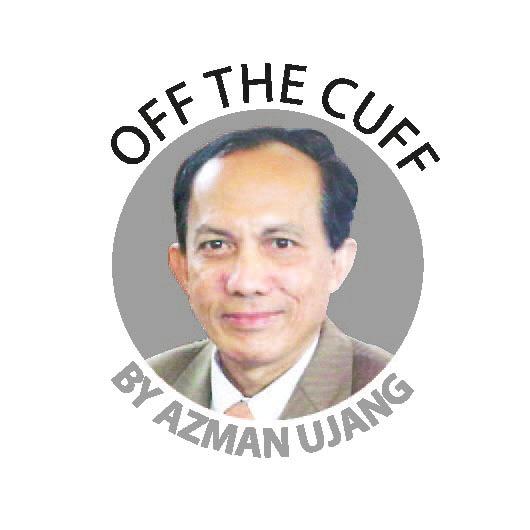THE brouhaha over the coronavirus contagion from Wuhan in China has been top breaking news worldwide the past week and will continue to be so for some time.
Thanks to social media that enables news to travel faster than the speed of sound, the entire world is gripped with fear of this new strain of coronavirus.
Out of endless news reports flowing into media outlets on the coronavirus, what I regard as the most thought-provoking was one written by Alexander Wong in an online portal under the headline, “This is deadlier than the Wuhan coronavirus but Malaysians don’t even bat an eye”.
While we are all agog about this virus scare – and rightfully so given its deadly implications – Wong focuses his attention on the mounting death toll on Malaysian roads from traffic crashes that is many times deadlier.
I salute Wong for this accurate indictment of how by and large Malaysians are taking the massive loss of lives on our roads and highways too much for granted and that hardly anyone in the corridors of power has expressed any concern for the issue.
It’s well and good to see the government machinery from top down being mobilised to prevent the new coronavirus from wreaking havoc among the population.
Many ministries are on alert and Deputy Prime Minister Datuk Seri Dr Wan Azizah Wan Ismail is leading the charge to enhance the level of preparedness.
Wong wrote in his article published on Monday that in the eight days of the annual Ops Selamat that police conducted for the Chinese New Year season, there had been 122 deaths on Malaysian roads or more than double the death toll of the Wuhan virus in China with its 1.2 billion population.
“That’s equivalent to 15 deaths per day which is far more devastating.
“It’s frustrating to see so many lives were lost and this isn’t due to some natural disaster or a deadly virus,” Wong wrote.
He said these are problems that can be solved by Malaysians if everyone has a shared responsibility to ensure road safety and there are things that the government needs to improve such as law enforcement and the design of roads.
“Perhaps it’s time for us Malaysians to focus on pressing matters close to home and to put more effort to make our roads safer,” said Wong.
I welcome Wong on board this “jihad” on road safety, something which I have been doing countless times in this column and via the Safety First group on WhatsApp.
Two days later when the 10-day Ops Selamat ended, the number of road deaths had swelled to 150 and as expected, the bulk or 102 deaths comprised motorcyclists and pillion riders.
According to World Health Organisation data for 2016, the death rate for road crashes in Malaysia at 23.6 per 100,000 people is almost twice higher than Indonesia with a population many times larger than us.
Pause for a moment on this point. It’s mind-boggling but like Wong says, Malaysians don’t even bat an eye.
It’s obvious from statistics published over decades that motorcycle riding poses the biggest threat to road safety. The two-wheelers make up an average of 4,500 deaths a year and it is sure to rise with the steep increase in the number of motorcyclists.
The surest way to drastically save lives among motorcyclists and pillion riders has got nothing to do with rocket science.
All we need to do is to have a motorcycle-friendly road system as a national policy. Period. By this I mean dedicated motorcycle lanes.
There is no need even to build extra lanes which might be cost-prohibitive. Just use the existing lanes on the left solely for motorcycles.
And equally vital, a lower speed limit for motorcycles.
How much more time and procrastination do the stakeholders tasked with traffic management and road safety need before they can come to terms with the reality and necessity of saving lives on roads?
I strongly urge Works Ministry officials to visit any city in China once the country is declared safe from the coronavirus outbreak to see how dedicated motorcycle lanes are built.
But after the study tour, we should not continue with business as usual but take firm steps to adopt what China has done.
Chris Syer, the president of the Malaysian British Society, a Briton who has been living in Malaysia as a permanent resident for 60 years, is genuinely concerned about the rampant loss of lives among motorcyclists.
“These are meaningless, senseless and futile deaths,” he told me.
“Whilst we are keen to tell the world that we have the tallest building or the longest chain of pizzas, we conveniently overlook the fact that we have the highest number of road fatalities,” he said.
For most of our motorcyclists whose riding culture is speeding, Syer has this advice: “Better late than dead on time”.
He said grim pictures of motorcycle-related deaths should also be prominently displayed like those on cigarette packets designed to deter smokers.
A group of 14 medical specialists and consultants in a letter published by some newspapers also expressed deep concern about motorcyclist deaths which they say are “totally preventable”.
Above all, the media must also up the ante on road safety by intensifying coverage that will lead to laws to be enacted for separate motorcycle lanes and lower speed limit.
Enough is enough.
The Ministry of Transport has taken quick action to push a law on heavier penalties for drink driving in Parliament in June despite that deaths from such offences are much lower compared with motorcycle crashes.
Why not show the same urgency for a motorcycle-friendly road system?
Comments: letters@thesundaily.com











